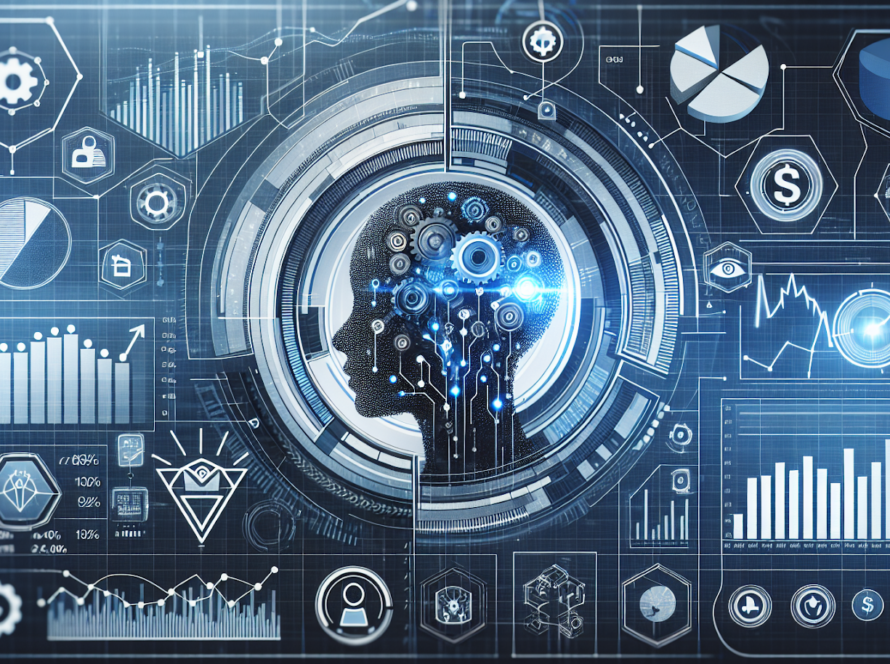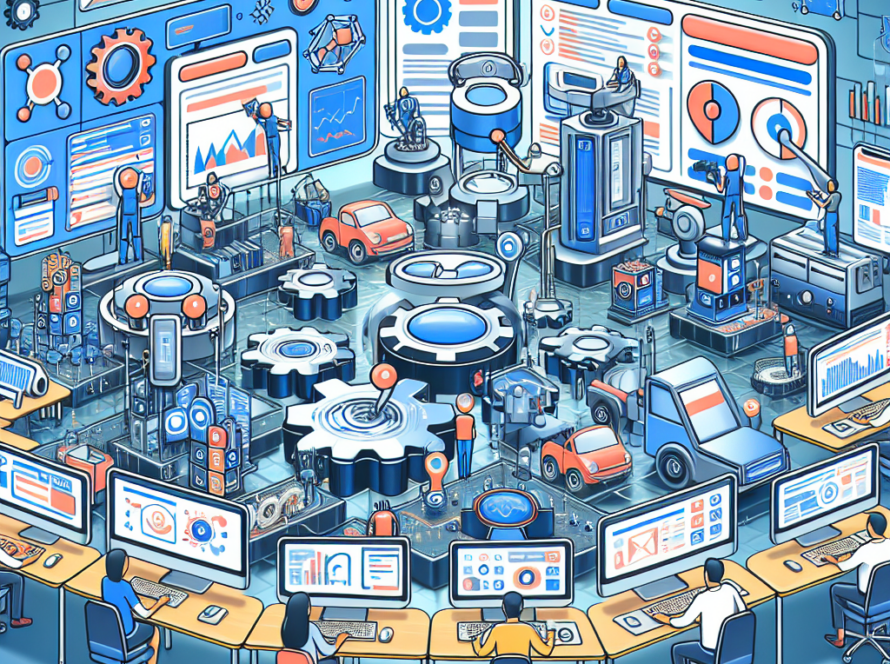Marketing agencies are constantly seeking ways to stay ahead of the competition and deliver exceptional results for their clients. One tool that has gained significant attention in recent years is artificial intelligence (AI). AI has revolutionized various industries, and marketing is no exception. By leveraging the power of AI, marketing agencies can automate tasks, analyze data more efficiently, and personalize campaigns to a degree that was previously unimaginable.
Demystifying the Buzz: What are AI Marketing Tools?
AI marketing tools encompass a variety of advanced software platforms that employ artificial intelligence to streamline and enhance marketing efforts. These tools are designed to automate mundane tasks, analyze large sets of data efficiently, and tailor marketing campaigns to individual consumer behaviors and preferences.
The scope of AI in marketing is broad, including but not limited to:
- Mail marketing automation
- Precise audience segmentation
- Dynamic content creation
- Predictive analytics, and
- Customer journey optimization
These tools leverage machine learning algorithms to process vast amounts of data quickly and accurately. They can identify patterns and trends that human marketers may overlook or take significantly longer to discover. By automating repetitive tasks such as data entry or report generation, AI frees up valuable time for marketers to focus on strategic planning and creative processes.
Types of AI Tools Marketers Can Use
There are several types of AI marketing tools available today that cater to different aspects of the marketing process.
AI-Generated Content For Marketers
Content creators can use AI to generate blog posts, product descriptions, social media captions, and other forms of content at an impressive speed. These tools provide marketers with a starting point that can be refined by human editors who ensure alignment with brand voice and quality standards.
Ad Optimization Platforms For Marketers
Ad optimization platforms utilize AI algorithms to refine ad targeting strategies using sophisticated pattern recognition across diverse datasets. This leads to more relevant audience reach and higher engagement rates. Additionally, these platforms can generate unique variations of ad copy and visual design tailored for different segments or even individuals, enabling marketers to deliver highly personalized experiences at scale.
How Chatbots Help Marketers
Chatbots are another type of AI marketing tool that have gained popularity in recent years. These virtual assistants use natural language processing and machine learning algorithms to engage with customers in real-time, providing them with personalized recommendations, answering queries, and even facilitating transactions. Chatbots not only enhance customer experience but also free up human resources by handling routine inquiries.
Automation Revolution: Will AI Replace Human Marketers?
One common concern surrounding the rise of AI in marketing is the fear of job displacement. However, it is important to note that AI is not poised to replace human marketers. Rather than being a substitute for human expertise, AI serves as a complementary asset that augments the capabilities of marketing teams.
By taking over time-consuming and repetitive tasks, AI enables marketers to devote more time to strategic planning, creative processes, and cultivating client relationships—all areas where the human touch remains irreplaceable. Moreover, the insights provided by AI can inform decision-making and strategy development in ways that were previously unattainable due to data complexity or volume.
AI in Action: Empowering Every Aspect of Marketing
The applications of AI in marketing are vast and span across various domains within the industry. Let’s explore some key areas where AI is making a significant impact:
AI in Advertising
In advertising specifically, AI has transformative potential. It can refine ad targeting strategies using sophisticated pattern recognition across diverse datasets leading to more relevant audience reach. Personalization extends into ad copywriting and visual design too—AI systems can generate unique variations tailored for different segments or even individuals. Predictive modeling allows advertisers to foresee shifts in consumer interests or behaviors before they become mainstream trends; this foresight ensures campaigns remain ahead of the curve and resonate strongly with target audiences. In short:
- Optimize targeting
- Craft personalized ads
- Predict audience trends
- Test variations for higher clicks and conversions.
AI in Digital Marketing
In the realm of digital marketing, AI plays a crucial role in automating various tasks. Email marketing automation platforms powered by AI can streamline the process of creating and sending personalized emails to segmented audiences. These platforms can analyze user behavior and preferences to deliver highly targeted content that resonates with individual recipients. AI-powered analytics tools enable marketers to gain deeper insights into website traffic patterns, allowing them to optimize user experiences and drive conversions. In short:
- Automate email campaigns
- Segment audiences
- Analyze website traffic
- Personalize customer journeys
AI for Content Marketing
Content marketing is an essential component of any successful marketing strategy. AI-powered content creators have revolutionized the way marketers approach content creation. These toolscan generate drafts of blog posts, product descriptions, social media captions, and other forms of content at an impressive speed. While these tools facilitate content creation at scale—a necessity in today’s content-rich digital landscape—it’s vital that businesses maintain oversight over such content ensuring it meets their strategic objectives while resonating authentically with their audience base. In short:
- Generate blog posts
- Create Product descriptions
- Create social media captions
- Analyze data for SEO optimization
ChatGPT in Marketing
ChatGPT offers immense potential for conversational AI, content creation, and personalized interactions with customers. Its natural language processing capabilities enable it to engage users in meaningful conversations, providing tailored responses based on their input.
In content creation, ChatGPT can generate high-quality text across various topics, from blog posts to marketing copy, saving time and resources for businesses.
Through personalized interactions, ChatGPT can analyze user preferences and behavior to deliver targeted recommendations and assistance, fostering deeper engagement and satisfaction.
With its versatility and adaptability, ChatGPT stands as a powerful tool for enhancing customer experiences and driving business growth.
Beyond Efficiency: Unlocking Creativity with AI
While efficiency gains are undoubtedly one of the primary benefits of integrating AI into marketing agencies’ workflows, there is another aspect that often goes unnoticed—the ability of AI to unlock creativity.
AI can spark creative ideas by analyzing vast amounts of data from various sources and identifying patterns or trends that humans may overlook. It can suggest relevant topics for content creation, optimize content formats for different channels, and even generate design concepts. By leveraging AI-powered creative tools, marketers can explore new avenues of creativity and deliver innovative campaigns that resonate with their target audiences.
of AI-powered Creative Tools Several AI-powered creative tools have emerged in recent years, showcasing the potential of human-AI collaboration. For example, Adobe Sensei is an AI platform that helps designers automate repetitive tasks such as image editing or layout adjustments, allowing them to focus on more strategic aspects of their work. Another example is Canva’s DesignAI feature, which uses machine learning algorithms to suggest design elements based on user preferences and previous designs. ChatGPT is a conversational and generative AI tool that has made content writing and creative ideating easier for writers.
These tools not only enhance productivity but also foster collaboration between humans and AI. By leveraging the unique capabilities of both parties, marketers can create compelling campaigns that combine human creativity with AI-driven insights.
Building the Future: Challenges and Ethics of AI in Marketing
While the benefits of integrating AI into marketing agencies are undeniable, it is essential to acknowledge the challenges and ethical considerations associated with its use.
Data Privacy
As AI relies heavily on data to function effectively, ensuring the security and privacy of customer data becomes paramount. Marketers must adopt robust data protection measures and comply with relevant regulations to maintain consumer trust.
Bias in Algorithms
AI systems learn from historical data, which may contain inherent biases. It is crucial for marketers to be aware of these biases and take steps to mitigate them by using diverse datasets and regularly auditing their models for fairness.
Maintaining Human Control While AI can automate many tasks and provide valuable insights, it should always be supervised by human experts who can exercise judgment when needed. Transparency in how AI systems operate is also essential to build trust with consumers.
Embracing the AI Advantage: Tips for Marketers
Implementing AI in marketing agencies can seem daunting, but with the right approach, it can be a game-changer. Here are some actionable steps for agencies to start harnessing the power of AI:
Identify Marketing Goals
When implementing AI in marketing, it’s crucial to have a clear understanding of what you want to achieve. Define your goals and objectives upfront so that you can identify the specific areas where AI can make a significant impact. Are you looking to improve targeting accuracy? Automate repetitive tasks? Enhance personalization at scale? By identifying your goals, you’ll have a roadmap for how to integrate AI effectively into your marketing strategy.
Choose the Right Tools
Choosing the right tools is essential when implementing AI in marketing. Conduct thorough research and evaluate different options based on their features, capabilities, and compatibility with your existing systems. Look for tools that align with your goals and cater to your specific needs. Whether it’s predictive analytics software or natural language processing tools, make sure they have the functionalities required to meet your objectives.
Integrate Data Sources
Data is at the heart of effective AI implementation in marketing. Ensure that you have access to relevant data sources and establish robust processes for data collection, storage, and analysis. The quality and quantity of data you feed into your AI systems will directly impact their performance and accuracy. Consider integrating various data sources, such as customer data, social media data, and market research data, to gain a comprehensive understanding of your target audience.
Train Your Team
Training your team is crucial for successful AI implementation in marketing. Provide them with the necessary resources and training to understand how to leverage AI tools effectively. Educate them on the capabilities of the tools you’ve chosen, teach them how to interpret AI-generated insights, and foster a culture of experimentation and learning. By empowering your team with the knowledge they need, you’ll ensure that they can make the most out of AI technology.
Measure Success
Measuring success is essential when implementing AI in marketing. Define key performance indicators (KPIs) that align with your goals and regularly monitor and evaluate the impact of AI on your marketing campaigns. This will allow you to assess whether your implementation is delivering the desired results or if there are areas that need improvement or optimization. By measuring success, you’ll be able to make data-driven decisions that drive better outcomes.
AI In Marketing Goes On and On
To further explore the potential of AI in marketing, there are numerous resources available online. Industry publications like Moz’s blog often feature case studies and best practices from leading marketers who have successfully integrated AI into their strategies. Additionally, webinars hosted by industry experts provide valuable insights into the latest advancements in AI technology. Attending conferences and events focused on AI and marketing can also offer opportunities to learn from industry leaders and to network with like-minded professionals.
For marketers looking for a more structured approach, online courses or certifications in AI or data analytics can equip them with the knowledge they need to leverage these technologies effectively. Platforms like Coursera, Udemy, and LinkedIn Learning offer a wide range of courses that cover various aspects of AI implementation in marketing.
How Will You Use AI in Your Marketing?
AI has become an invaluable asset for marketing agencies looking to enhance their efficiency, deliver personalized experiences at scale, unlock creativity, and gain deeper insights into consumer behavior. By embracing responsible AI practices, marketers can navigate the challenges associated with its use while reaping its numerous benefits. As technology continues to evolve rapidly, staying informed about the latest advancements in AI will be crucial for marketers seeking a competitive edge in today’s digital landscape. With the right approach and tools, marketers can harness the power of AI to drive innovation and achieve remarkable results.



